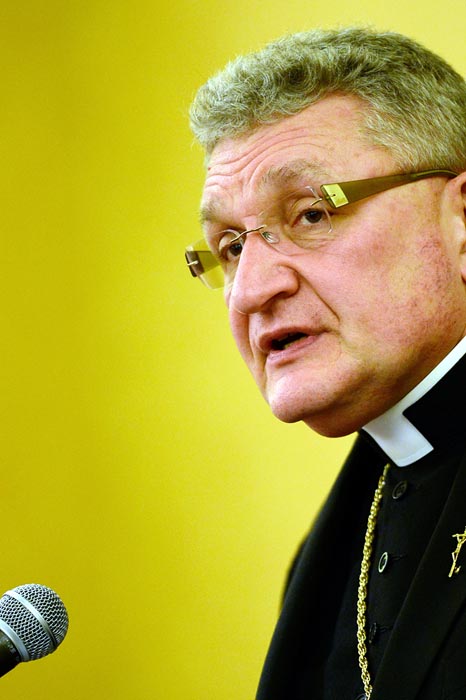
Pittsburgh Bishop David A. Zubik applauded the Nov. 21 ruling of a U.S. district judge who granted an injunction on the lawsuit of the Pittsburgh and Erie dioceses on behalf of church-affiliated organizations objecting to the HHS contraceptive mandate. (Chris Heisey/The Catholic Witness)
The dioceses of Pittsburgh and Erie have both won a significant step forward in their fight against a regulation of the U.S. Department of Health and Human Services that mandates use of contraceptives and other aspects of the Affordable Care Act to which the Catholic Church morally objects.
While the dioceses are exempt from complying with the mandate, Catholic organizations such as Catholic Charities, which serve all people regardless of creed, received no exemption and faced heavy fines for non-compliance beginning Jan. 1, 2014.
Catholic Charities of Pittsburgh faced $2 million in annual penalties.
According to a report in the Pittsburgh Post Gazette newspaper, U.S. District Judge Arthur J. Schwab granted an injunction Nov. 21 sought by the Catholic Diocese of Pittsburgh, Diocese of Erie and several affiliated nonprofit groups that “do not want their insurance administrators to provide what they call ‘preventive services’ coverage.”
Schwab sided with the diocesan argument that no distinction could be drawn between the charitable arms of the church and its houses of worship, including the dioceses.
The judge wrote that he was ruling on whether “the Government will be permitted to sever the Catholic Church into two parts (i.e., worship and faith, and ‘good works’) — in other words, whether the Government will be successful in restricting the Right to the Free Exercise of Religion as set forth in the First Amendment to a Right to Worship only,” according to the newspaper.
[hotblock]
He further said he failed to see the distinction between a diocese, which is exempt, and a church-related institution such as Catholic Charities, which is not exempt. He ruled that both should enjoy an exemption from the mandate.
Pittsburgh Bishop David A. Zubik said in a statement on the Pittsburgh Diocese’s website that “all who recognize the importance of religious liberty should be very pleased” with the ruling.
Church entities “would have faced a government mandate to provide access to abortion-inducing drugs, sterilization services, contraceptives and related counseling,” the bishop wrote.
“Acknowledging that our beliefs are sincerely held, Judge Schwab found that the good works that the church provides in society are both essential and integral to who we are as believers. He recognized that the fines scheduled to be imposed in a matter of weeks would have gravely impacted the charitable and educational services of the church, harming those who are most vulnerable and depend on the church’s ministry for their health and well-being.
“Critically, Judge Schwab refused to accept that religious freedom is solely the freedom to worship behind closed doors. When the church ‘loves our neighbor,’ Judge Schwab effectively ruled, it cannot be punished or forced to compromise its beliefs. These good works are not secondary to the practice of faith, but are central. Judge Schwab’s ruling affirms that fundamental constitutional understanding of religious freedom,” Bishop Zubik wrote.
The Post Gazette reported that Schwab noted at the hearing that he is not Catholic. He nonetheless wrote in his opinion that the “sanctity of human life from conception to natural death and the dignity of all persons are central tenets of the Catechism of the Catholic Church.”
“This belief necessarily prohibits providing, subsidizing, initiating or facilitating insurance coverage for abortion-inducing drugs, sterilization services, contraceptives and related educational and counseling services,” the newspaper quoted him as writing.
The provision of the coverage, Schwab wrote, could result in “decreased donations, loss of employees to other employers, loss of services” and fines that could force the closure of community assets.
The injunction allows the dioceses and affiliated organizations to continue to offer insurance that does not include contraception, sterilization and abortion-inducing drugs while litigation continues.
Both the dioceses as plaintiffs and the U.S. Department of Justice indicated they intend to litigate the matter next to the third Circuit Court of Appeals and if necessary to the U.S. Supreme Court.
The Catholic Church in the United States, Bishop Zubik wrote in his statement, “has always supported access to health care coverage for everyone. The lawsuit does not call into question the Affordable Care Act itself. Our lawsuit brings to the courts our most serious objection to one aspect of the Affordable Care Act as imposed by HHS.”
He said the law firm of Jones Day is representing on a pro bono basis the Diocese of Pittsburgh and Catholic Charities, which “are protecting the church’s ability to continue to serve the poor as it has for generations.”
“Judge Schwab,” the bishop concluded, “has taken an important step in recognizing this obvious, fundamental truth” and rejected a contention that the government may not “cleave ‘faith and good works’ without fundamentally restricting the right to the free exercise of religion as set forth in the First Amendment.”
“Without works,” Bishop Zubik said, “faith is dead.”
PREVIOUS: Farrell named head of planning for 2015 World Meeting of Families
NEXT: Abington parish marks half-century of church built in Mary’s name



Share this story